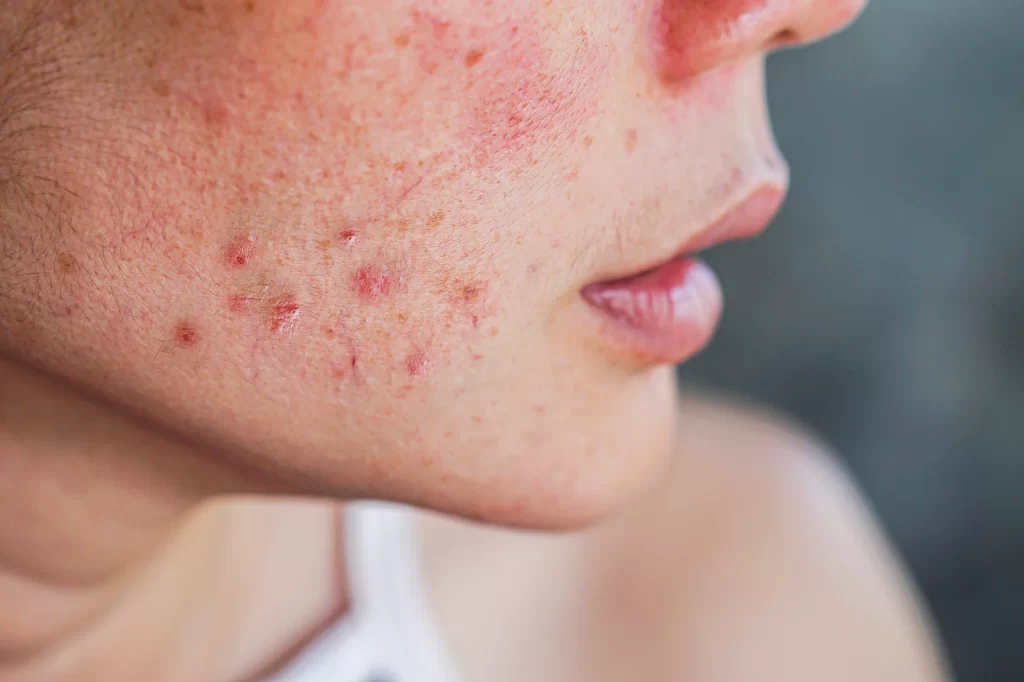How To Treat Hormonal Acne Without Damaging Your Skin Barrier

How To Treat Hormonal Acne Without Damaging Your Skin Barrier
How to treat acne without damaging the skin barrier?
Great question — treating acne while protecting your skin barrier is key to long-term healthy, clear skin. 💪 Let’s break it down into simple, effective steps:
🧖♀️ 1. Use a Gentle Cleanser (AM + PM)
- Avoid foaming or stripping cleansers with sulfates or alcohol.
- Look for low pH, non-drying formulas (like ones with ceramides, centella, or green tea). 👉 Goal: Clean without that tight, squeaky feeling.
🌿 2. Choose Targeted Acne Treatments Wisely
Stick to gentle, science-backed actives:
- Salicylic acid (BHA): Deep-cleans pores.
- Niacinamide: Reduces inflammation + controls oil.
- Azelaic acid: Fights acne + redness with low irritation.
- Benzoyl peroxide (low %, 2.5%): Effective but can be drying — spot treat only.
👉 Introduce slowly (2–3x/week), then build up if your skin tolerates it.
💧 3. Moisturize (Yes, Even Oily/Acne-Prone Skin!)
Moisturizers help repair and maintain your skin barrier. Look for:
- Gel or lotion textures
- Ingredients like ceramides, panthenol, squalane, or hyaluronic acid 👉 Hydration = less oil production + calmer skin.
🧴 4. Use Sunscreen Every Morning
Many acne treatments make your skin more sensitive to sun. Choose:
- Oil-free, non-comedogenic formulas
- Mineral or hybrid sunscreens (zinc oxide is great for acne-prone skin)
👉 Protects your barrier + prevents dark spots.
🧼 5. Avoid Harsh Scrubs & Over-Exfoliation
Physical scrubs, strong acids, or exfoliating too often can wreck your barrier.
👉 Stick to chemical exfoliation 1–2x/week max, and always moisturize after.
💆♀️ 6. Don’t Pick or Squeeze Pimples
It can cause scarring and damage the barrier.
👉 Use pimple patches or spot treatments instead.
🧘♀️ 7. Be Consistent and Patient
Clear skin takes time. Don’t jump between products every few days — give your skin at least 4–6 weeks to adjust.
Can a damaged skin barrier cause hormonal acne?
Not directly — but a damaged skin barrier can definitely make hormonal acne worse or harder to heal. Let me explain how they’re connected 👇
💥 What’s Hormonal Acne?
It’s usually caused by internal hormone fluctuations (think: puberty, periods, pregnancy, PCOS, stress), and it often shows up as:
- Deep, cystic breakouts
- Jawline, chin, and lower cheeks
- Flare-ups during certain times of the month
🧱 What’s the Skin Barrier?
It’s your skin’s outermost layer — like a shield — made up of fats, proteins, and cells that keep moisture in and bad stuff (like bacteria and irritants) out.
🔁 How They Interact:
✅ Healthy Barrier = Calmer Skin
- Keeps inflammation low
- Helps acne heal faster
- Reduces risk of post-acne marks and scarring
❌ Damaged Barrier = Complicated Acne
- Skin becomes more inflamed, sensitive, and reactive
- Breakouts feel more painful or appear redder
- Acne products (like retinol or acids) sting or worsen irritation
- Skin may overproduce oil to compensate, triggering more clogged pores
👩🔬 In Short:
No — your skin barrier doesn’t cause hormonal acne.
But yes — if your barrier is compromised, it can amplify breakouts, delay healing, and make your acne treatments less effective.
How can I reduce my risk of hormonal acne?
Reducing your risk of hormonal acne is totally doable — while you can’t fully control your hormones, you can manage the triggers and support your skin + body to keep breakouts minimal and less intense. Here’s a solid plan:
🥗 1. Balance Your Diet
What you eat impacts your hormones and skin:
- ✅ Add: leafy greens, berries, fatty fish (omega-3s), seeds (like flax or chia), whole grains
- ❌ Reduce: dairy (especially skim milk), high-sugar snacks, and refined carbs (white bread, pasta) 👉 These can spike insulin and androgens, which trigger breakouts.
🧘♀️ 2. Manage Stress (Huge One!)
Stress increases cortisol, which messes with other hormones and oil production.
Try:
- Meditation, deep breathing, yoga
- Walks or short digital detoxes
- Sleep! Aim for 7–9 hours
💊 3. Talk to a Doctor About Hormonal Imbalance
If your acne is severe or flares up around your cycle:
- Ask about birth control, spironolactone, or other hormonal treatments
- A simple blood test might reveal PCOS or other hormone-related causes
🧼 4. Use Hormone-Friendly Skincare
Keep your skincare routine gentle, consistent, and barrier-friendly. Focus on:
- Salicylic acid or azelaic acid to unclog pores + calm inflammation
- Niacinamide to reduce oil and strengthen skin
- Non-comedogenic moisturizer to hydrate without clogging
- Always wear SPF
💧 5. Stay Hydrated
Drinking enough water helps flush toxins and supports your body’s natural hormone balance.
🚫 6. Avoid Pore-Clogging Products
Check makeup and haircare for:
- Mineral oil
- Coconut oil
- Isopropyl myristate
👉 These can worsen hormonal acne for some people.
🧬 7. Track Your Cycle
Use an app to track when breakouts occur — you can then adjust skincare or lifestyle in that window (e.g., add anti-inflammatory foods or calming masks a few days before your period).
How do I tell if my skin barrier is damaged?
Great question — a damaged skin barrier isn’t always obvious, but your skin definitely tries to tell you. Here are the classic signs to watch for:
🚨 Signs Your Skin Barrier Might Be Damaged:
🔥 1. Increased Sensitivity
- Skin feels stingy, tingly, or burns when applying products — even ones that never used to irritate you.
🪵 2. Dryness & Tightness
- Skin feels rough, flaky, or tight no matter how much moisturizer you use.
🧴 3. Redness or Inflammation
- Your skin looks flushed or irritated, especially around the cheeks and nose.
😣 4. Breakouts or Rashes
- You’re breaking out more, even in areas you normally don’t.
- Bumps or itchy patches could also show up.
💧 5. Dehydration & Dullness
- Your skin looks lifeless or “tired.”
- Makeup might not sit well or cling to dry patches.
🌡️ 6. Itchy, Burning, or Hot Feeling
- Especially after cleansing or applying actives like retinol or acids.
🩹 7. Slower Healing
- Breakouts, scars, or irritation take longer to fade than usual.
🔍 Common Causes of a Damaged Barrier:
- Over-exfoliating (physical or chemical)
- Using too many actives at once (retinol, acids, vitamin C, etc.)
- Harsh cleansers or cleansing too often
- Skipping moisturizer
- Extreme weather (wind, cold, heat)
✅ Want to Test It? Try This:
After cleansing, skip all products and wait 5–10 minutes.
If your skin starts to feel:
- Tight
- Hot or stingy
- Uncomfortable
Your barrier may be compromised.
Can skincare stop hormonal acne?
Skincare alone can’t completely stop hormonal acne — but it can seriously help manage it, reduce breakouts, calm inflammation, and protect your skin while your body deals with the hormonal changes. 💪
🤷♀️ Why Skincare Alone Isn’t Enough
Hormonal acne is triggered from inside your body — things like:
- Menstrual cycle
- PCOS
- Stress
- Birth control changes
- Diet/hormone fluctuations
👉 So while a good routine can’t fix the root hormonal cause, it can absolutely prevent it from becoming worse.
✅ What Skincare Can Do for Hormonal Acne
- Unclog Pores
- Use salicylic acid (BHA) to deep clean and prevent breakouts.
- Reduce Inflammation
- Look for azelaic acid, niacinamide, green tea, or centella asiatica.
- Balance Oil Production
- Niacinamide and gentle moisturizers help calm oil glands without overdrying.
- Speed Up Healing
- Barrier-friendly care and lightweight hydration (like ceramides, panthenol) helps skin repair faster.
- Prevent Post-Acne Marks
- Use SPF and calming ingredients to stop dark spots from forming or sticking around.
🧴 Bonus: The Right Skincare Makes Medical Treatments Work Better
If you’re using things like spironolactone, birth control, or retinoids, good skincare will support the process — less irritation, fewer flare-ups, and better long-term results.


